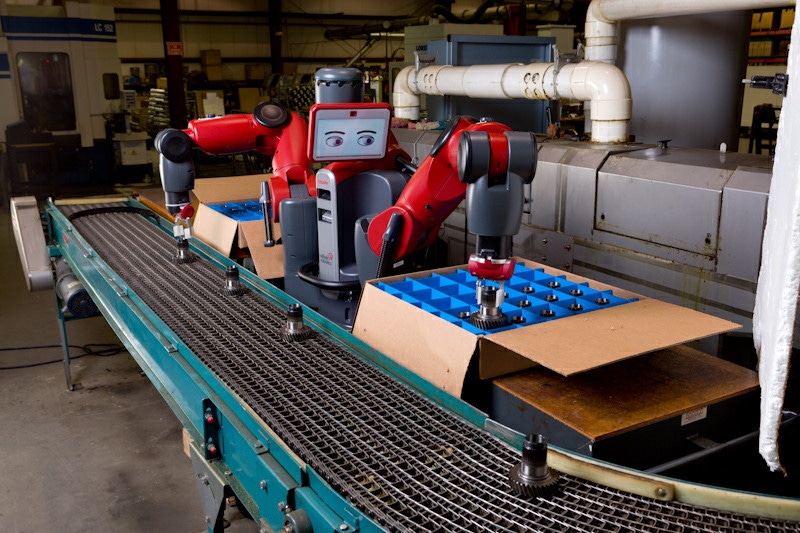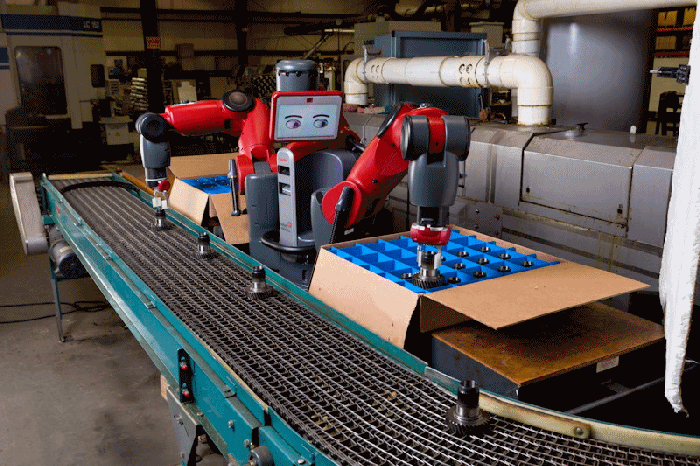One of America's largest injection molders thinks a humanoid robot may be one of the keys to advancing a reshoring of manufacturing jobs to the United States.Nypro recently tested a newly developed Rethink robot and is taking delivery next month of one the first $22,000 units to roll off the assembly line in New Hampshire. "Many more may be on the way," Al Cotton, a spokesman for Nypro, told PlasticsToday.
September 24, 2012

One of America's largest injection molders thinks a humanoid robot may be one of the keys to advancing a reshoring of manufacturing jobs to the United States.
Nypro recently tested a newly developed Rethink robot and is taking delivery next month of one the first $22,000 units to roll off the assembly line in New Hampshire. "Many more may be on the way," Al Cotton, a spokesman for Nypro, told PlasticsToday.
"The Rethink robots will not be used to replace existing robots," said Cotton. "They will be used to perform unsafe jobs or repeatable tasks. The beauty of them is that they are so safe they can be placed right next to a worker."
|
You can buy a "Baxter" for $22,000. |
Robots typically used in manufacturing plants such as Nypro's highly automated flagship medical molding and assembly plant in Clinton, MA are placed within protective cages to avoid potential injury to people in the plant. And they do one thing over and over - very precisely.
The Rethink robot, developed by Rodney Brooks, co-founder of iRobot and former director of the MIT Computer Science and Artificial Intelligence Lab, is very different in both respects. Brooks' robot can be easily "trained" to do many different pick-and-place types of jobs in close proximity to humans. Brooks' goal was to break down the cost and safety barriers that he feels have limited automation in American manufacturing.
"Roboticists have been successful in designing robots capable of super-human speed and precision. What's proven more difficult is inventing robots that can act as we do—in other words, that are able to inherently understand and adapt to their environments," said Brooks. "We believed that if we could cross that chasm with the manufacturing environment specifically in mind, we could offer new hope to the millions of American manufacturers who are looking for innovative ways to compete in our global economy."
Brooks has given the robot a human name "Baxter" to reinforce the idea that this is not your grandfather's robot. In another touch, the robot includes an LCD screen with an animated face—an odd look for a factory floor. He points to six examples of how Baxter is different:
Common sense capability. If Baxter drops an object, it knows to get another.
No more cages. Special sensors and related software help it see and understand its environment.
It can be trained as you would teach a person. According to Brooks, factory workers can train Baxter to do a task in less than 30 minutes using prompts on the LCD screen.
Flexibility. It can be trained to do several different jobs in one day.
Affordability. Its $22,000 is a fraction of the cost of a traditional industrial robot.
Fast rampup. Baxter comes ready to be used on the factory floor in less than one hour.
The Rethink robot in Nypro's plant will be nowhere near as fast or as precise as the Wittmann Battenfeld robots on many of the Netstal and Roboshot machines in its Class A molding room. Different types of drive mechanisms are used to slash costs below what press-side robots cost. So the Rethink robots serve a different purpose than the robots typically found in molding shops where robots must respond very exactly every time to split-second molding cycles. They could possibly fit into a custom assembly area, for example.
Another way that Rethink Robotics cut costs was through extensive use of plastics in the construction of Baxter. And it is 75% sourced and produced in the United States.
The Baxter robots will get faster.
A software development kit will be available early next year so that Baxter can be reprogrammed to fit a company's specific requirements. And because of its low cost, that company could be a 10-to-15 person molding shop that never could have afforded robots, also giving them a shot in being more competitive against the "China price".
Brooks thinks that Baxter will perform work at the equivalent of about $4 per hour.
Another plastics manufacturer that has tested the Rethink robot is Vanguard Plastics, a 40-year-old custom injection molder in Southington, CT.
Rethink Robotics is funded ($62 million) by Charles River Ventures, Highland Capital Partners, Sigma Partners, Draper Fisher Jurvetson and Bezos Expeditions, the personal investment company of Jeff Bezos.
You May Also Like



